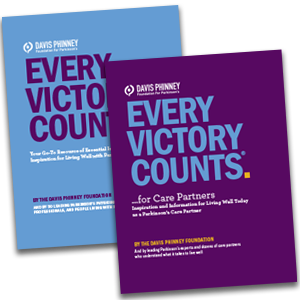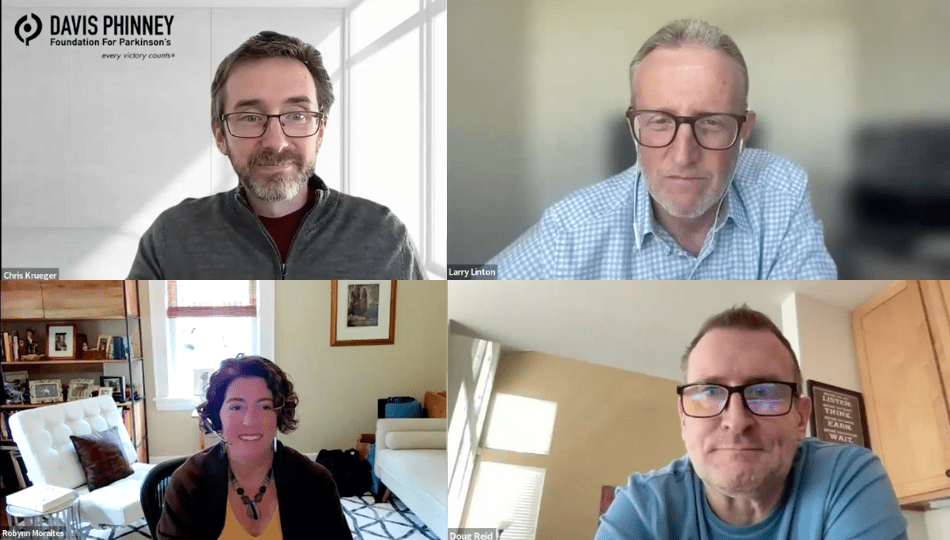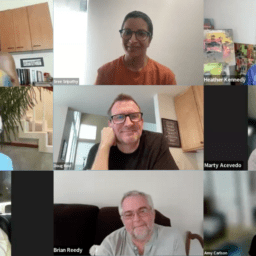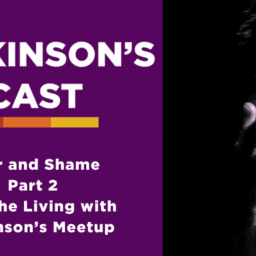When living with Parkinson’s, it often seems like there’s some new challenge to face and some new thing to learn. During this month’s meetup, the panelists discussed the most important lessons they’ve learned while living with Parkinson’s, as well as some of the trickier lessons they’re working through.
Read on for a summary of the conversation and to access a recording of the meetup. If you haven’t attended our meetups live, register to receive the link to do so.
Download the audio version of this webinar.
From Diagnosis to Acceptance
Following a Parkinson’s diagnosis, most people must work through the five stages of grief. For some, this includes an extensive “pity party,” while for others it looks like a mad dash to “out-exercise Parkinson’s.” Regardless of what the process looks like for you, the crucial thing to remember is to give yourself grace, let yourself grieve, and acknowledge how you feel.
For our panelists, the transition from diagnosis to acceptance has been full of both challenges and victories. Along the way have been many “aha!” moments and times when they recognized–and leaned into–the need to step back, say no, or adapt to changing circumstances.
Recalibrating
As your Parkinson’s symptoms change, you will need to deeply think about changes you need to make in your career, relationships, and many other aspects of life. Our panelists suggest making a list of things you have to give up and a separate list of the many things you can still do.
For many people with Parkinson’s–including some of our panelists–the need to recalibrate becomes quickly evident in exercise choices. Chris highlighted his transition from team sports to solo activities, saying that exercise is so integral to symptom management that the risk of an injury through team sports isn’t worth a setback. Ample research supports this idea, continually showing that physical exercise is “medicine for Parkinson’s.” Rather than seeing this as a setback, he explained, “the whole world has gotten bigger for me,” and that new, positive opportunities and experiences are a continual part of his life with Parkinson’s.
Other panelists shared that for them, recalibration looks like making plans a year out rather than two or three. Robynn shared that acceptance means adjusting your expectations for yourself, and managing your life and your plans in new and thoughtful ways. Larry highlighted that for him, acceptance means giving himself permission to feel off one day and then come back strong the next, and to not panic when a new symptom pops up.
Setting Boundaries
One of the positive outcomes of accepting Parkinson’s is the newfound ability to say no–a point all our panelists touched on. Robynn explained how neurological exhaustion is different from physical exhaustion, and that she has learned to be mindful about her energy levels. Similar lessons, she said, include the need to sidestep “emotional booby-traps” and to rest when she needs to. Doug, who shared that he is working through challenges related to apathy, said he helps manage his issues by not sweating the small stuff and instead focusing on what’s important in his life. He and his fellow panelists also explained that being mindful and slowing down are essential to living well and maintaining quality of life.
If you are a care partner to someone living with Parkinson’s, you can help them set and maintain barriers by asking them what daily activities feel replenishing and which tasks feel taxing. This can help your person focus on activities that energize them, and it can help them feel supported as they navigate changes in their symptoms and experiences.
Exploring Treatments
An important lesson several of our panelists have learned is to openly communicate with their care team and ask about new and developing treatment options. For Robynn and Doug, this led to successful deep-brain stimulation (DBS) surgery early in their Parkinson’s journeys. The panelists discussed that while DBS has inherent risks and does not benefit everyone with Parkinson’s–and how recovery can be full of its own challenges and lessons learned–for many people it is hugely transformative.
Similarly, some Parkinson’s medications work well for certain people while having limited or negative impacts on others. Don’t be afraid to tell your doctor what you’re really experiencing, our panelists said, and remember to advocate for yourself so you can fine tune your treatments. “Our quality of life is so dependent on having agency and taking action and advocating for ourselves,” Robynn reminded listeners.
Next Meetup
Join us for our next meetup on June 20, 2024.
The panelists always welcome your questions! Please send them using this form or by emailing blog@dpf.org.
Additional Resources
[Webinar Recording] The What, When, Why, How & More of DBS with Dr. Kara Beasley
[Webinar Recording] Speech, Voice, and Parkinson’s
Understanding and Discussing Mental Health Aspects of Parkinson’s
 WANT MORE PRACTICAL ARTICLES LIKE THIS?
WANT MORE PRACTICAL ARTICLES LIKE THIS?
You can learn much more about living well with Parkinson’s today through our Every Victory Counts® suite of resources. Each manual is packed with up-to-date information about everything Parkinson’s. Click the link below to reserve your manual(s).
Thank you to our 2024 Gold Partner, AbbVie, and our Silver Partner, Mitsubishi Tanabe Pharma America, for their ongoing support of these must-have manuals. Additionally, we’d like to thank Barbara and Dale Ankenman, Abby and Ken Dawkins, Bonnie Gibbons, Irwin Narter, Lorraine and J Wilson, and Gail Gitin in loving memory of Gene Gitin for their generous donations that allow us to make these resources available and accessible to all.

















